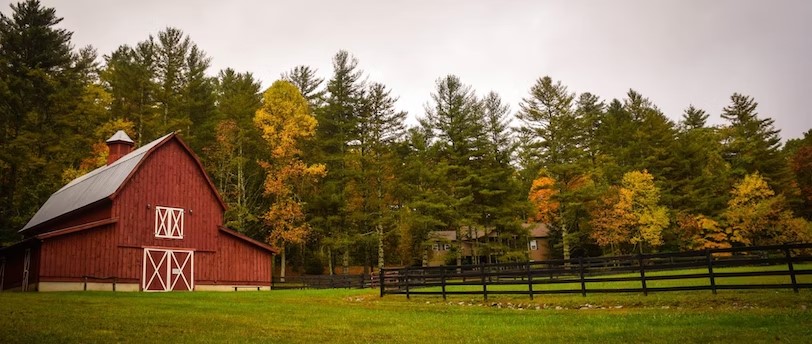Interested about where your clothes come from and the impact they have on the environment? In this article, we will take you on a journey from farm to fashion, exploring the fascinating world of organic clothing. From the cultivation of organic fibres on farms to sustainable farming practices, we will delve into the production process and highlight the benefits of choosing organic clothing for both the environment and your health.
The journey begins with cultivating organic fibres on farms. Organic cotton, hemp, and flax are some of the most common fibres used in organic clothing. These plants are grown using natural methods that avoid synthetic pesticides and genetically modified organisms (GMOs). Instead, farmers rely on techniques such as crop rotation, composting, and biological pest control to maintain healthy soil fertility and minimize environmental impact. By choosing organic fibres over conventional ones, you can support sustainable agriculture practices that promote biodiversity and protect our planet’s precious resources.
Key Takeaways
- Organic clothing is made from organic fibres grown without synthetic pesticides or GMOs, promoting environmental sustainability.
- Sustainable farming practices in organic farming, such as crop rotation and water conservation, benefit soil health, and biodiversity, and reduce the need for synthetic inputs.
- The production process of organic clothing involves sourcing sustainable materials, spinning, weaving, dyeing, and quality control checks to ensure durability and proper finishing.
- Choosing organic clothing supports a supply chain that values social responsibility, reduces pesticide use in agriculture, and promotes a healthier lifestyle.
Table of Contents

Cultivating Organic Fibers on Farms
You might be surprised to learn that cultivating organic fibres on farms involves a whole lot more than just planting seeds and watching them grow. Organic fibre sources, such as cotton, linen, and hemp, require meticulous care and attention to ensure the highest quality. Farmers who choose to grow organic fibres must adhere to strict guidelines that prohibit the use of synthetic fertilizers, pesticides, or genetically modified organisms (GMOs). This not only benefits the environment but also has a positive impact on local communities.
Growing organic fibres requires farmers to adopt sustainable farming practices that promote soil health and biodiversity. Instead of relying on chemical inputs, organic farmers use natural methods like crop rotation and composting to enrich the soil. By doing so, they create a healthier ecosystem for beneficial insects and microorganisms while reducing soil erosion. These techniques not only improve the quality of the crops but also contribute to long-term environmental sustainability.
The decision to cultivate organic fibres can have significant social impacts on local communities as well. Organic farming often requires more labour-intensive practices due to the absence of synthetic chemicals. This creates employment opportunities in rural areas where job opportunities may be limited. Additionally, by avoiding harmful pesticides and GMOs, organic farming helps protect the health of farmworkers from exposure to toxic substances. Overall, cultivating organic fibres on farms goes beyond simply growing crops; it is a commitment towards sustainable agriculture that benefits both the environment and local communities.
Sustainable Farming Practices
Explore the remarkable realm of sustainable farming practices, where every step taken towards ecological harmony contributes to a greener and more responsible production process. Sustainable agriculture is a holistic approach to farming that focuses on creating a balance between economic profitability, environmental stewardship, and social responsibility. By implementing eco-friendly farming methods, farmers strive to minimize their impact on the environment while maximizing yields and preserving natural resources.
One key aspect of sustainable farming is soil conservation. Farmers use techniques such as crop rotation, cover cropping, and minimal tillage to prevent soil erosion and maintain its fertility. These practices help retain moisture in the soil while reducing the need for synthetic fertilizers and pesticides. Additionally, sustainable farmers prioritize organic matter management by composting crop residues and applying it back into the fields. This not only enriches the soil but also reduces greenhouse gas emissions.
Water conservation is another critical component of sustainable agriculture. Farmers employ various strategies to reduce water usage, such as drip irrigation systems that deliver water directly to plant roots or using rainwater harvesting techniques. By optimizing water usage, farmers can ensure efficient hydration for crops while minimizing waste and preserving this precious resource.
Furthermore, sustainable farming practices take into account biodiversity preservation. Farmers create habitats for beneficial insects like bees and ladybugs by planting hedgerows or leaving areas uncultivated. This helps control pests naturally without relying on chemical insecticides that harm both the environment and human health. In addition to promoting biodiversity within their farms, sustainable farmers often collaborate with local communities to protect nearby wildlife habitats through land conservation efforts.
Sustainable farming practices are essential for achieving ecological harmony in agricultural production processes. Through strategies such as soil conservation, water conservation, and biodiversity preservation, farmers can cultivate organic fibres in an eco-friendly manner. By prioritizing sustainability at every stage of cultivation, from farm to fashion, we can contribute to a greener future while enjoying high-quality clothing made from organic materials.
The Production Process of Organic Clothing
Immerse yourself in the fascinating process of creating sustainable garments that embody ecological harmony and responsible production. The production process of organic clothing is a meticulous journey that begins with sourcing sustainable materials and ends with delivering ethically-made fashion to conscious consumers. This process is driven by the principles of ethical fashion and consumer awareness, aiming to minimize the negative impact on the environment and ensure fair treatment for workers.
The first step in producing organic clothing is sourcing sustainable materials. Organic cotton, hemp, bamboo, and linen are commonly used because they require less water and pesticides compared to conventional fabrics. These materials are carefully selected from certified organic farms that prioritize biodiversity, soil health, and water conservation. By choosing eco-friendly fibres, the fashion industry can contribute to reducing water pollution, soil degradation, and carbon emissions caused by chemical-intensive farming practices.
Once the raw materials have been sourced, they undergo a series of processes to transform them into wearable garments. This includes spinning the fibres into yarns which are then knitted or woven into fabric. The dyeing process also plays a crucial role in ensuring ethical production. Many organic clothing brands opt for natural dyes made from plants or low-impact synthetic dyes that minimize harm to both workers and the environment.
Before reaching consumers’ hands, organic clothing goes through quality control checks to ensure durability and proper finishing. Ethical fashion brands prioritize fair wages and safe working conditions for their employees throughout these manufacturing stages. By choosing organic clothing produced under ethical standards, consumers can support a supply chain that values social responsibility.
In conclusion, understanding the production process of organic clothing sheds light on how it contributes to ethical fashion practices while raising consumer awareness about sustainability issues within the industry. From sourcing sustainable materials to maintaining fair working conditions throughout manufacturing stages, every step is carefully orchestrated towards minimizing environmental harm and promoting responsible consumption choices. Embracing organic clothing not only allows us to look good but also to feel good about our contribution to a more sustainable and ethical fashion industry.
Benefits of Organic Clothing for the Environment
Discover the incredibly positive impact that sustainable garments have on our environment. By choosing organic clothing, you are actively contributing to the reduction of pesticide use in agriculture. Traditional cotton farming relies heavily on pesticides, which can be harmful to both human health and the environment. Organic clothing is made from crops that are grown without the use of synthetic pesticides or genetically modified organisms (GMOs). This not only helps protect farmers and workers from exposure to toxic chemicals but also prevents these harmful substances from seeping into our soil and water systems.
In addition to reducing pesticide use, organic clothing also plays a crucial role in preserving soil quality. Conventional cotton farming practices often involve heavy tilling and the use of harsh chemical fertilizers, which deplete nutrients in the soil over time. On the other hand, organic farming methods focus on building healthy soil through techniques such as crop rotation, composting, and natural pest control. These practices help maintain soil fertility and structure, ensuring long-term sustainability for future generations.
Furthermore, organic clothing promotes biodiversity by providing a habitat for various plant and animal species. Organic farms prioritize ecological balance by creating diverse ecosystems where different plants can thrive alongside each other. This encourages beneficial insects like pollinators to flourish while naturally controlling pests without relying on harmful chemicals. By supporting organic clothing brands, you are contributing to the preservation of biodiversity and helping create a healthier environment for all living beings.
Choosing organic clothing has numerous benefits for our environment. It reduces pesticide use in agriculture, preserves soil quality through sustainable farming practices, and promotes biodiversity by creating habitats for various species. By making conscious choices about what we wear, we can contribute to a more sustainable fashion industry that prioritizes environmental protection and ethical production methods.
Health Benefits of Choosing Organic Clothing
By opting for organic garments, you can reap the health benefits of wearing clothing free from harmful chemicals and synthetic materials. Organic clothing is made from natural fibres that are grown without the use of pesticides or genetically modified organisms (GMOs). This means that when you wear organic clothing, you are reducing your exposure to these potentially harmful substances.
One of the key health benefits of choosing organic clothing is that it reduces the risk of skin irritation and allergies. Conventional clothing often contains residual chemicals from the manufacturing process, such as formaldehyde, which can cause skin rashes and allergic reactions. Organic clothing, on the other hand, is free from these chemicals, making it a safer option for those with sensitive skin.
Ethical sourcing is another important aspect of organic clothing that contributes to its health benefits. Organic garments are produced using sustainable practices that prioritize worker safety and fair wages. This means that by choosing organic clothing, you are supporting a supply chain that values human well-being and promotes social justice.
Consumer awareness plays a crucial role in reaping the health benefits of organic clothing. By educating yourself about the potential risks associated with conventional textiles and understanding the importance of ethical sourcing, you can make informed choices when purchasing clothes. Look for certifications such as GOTS (Global Organic Textile Standard) when shopping for organic garments to ensure their authenticity.
Opting for organic clothing not only has environmental benefits but also offers significant health advantages. By wearing clothes made from natural fibres grown without pesticides or GMOs, you reduce your exposure to harmful chemicals found in conventional textiles. Additionally, ethical sourcing practices ensure worker safety and fair wages throughout the supply chain. With increased consumer awareness about these issues, we can make more conscious choices when it comes to our wardrobe and promote a healthier lifestyle overall, ultimately leading to a more sustainable and equitable fashion industry.
Conclusion
In conclusion, the journey of organic clothing from farm to fashion is truly remarkable. Starting with cultivating organic fibres on farms, farmers employ sustainable farming practices that prioritize the health of the environment and its inhabitants. This includes avoiding harmful chemicals and pesticides, promoting biodiversity, and conserving water resources.
The production process of organic clothing involves careful attention to detail and adherence to strict standards. From harvesting the crops to spinning yarns and weaving fabrics, every step is meticulously executed to ensure the highest quality end product. The use of natural dyes further adds to the sustainability factor of organic clothing.
One of the key benefits of choosing organic clothing lies in its positive impact on the environment. By avoiding synthetic fertilizers and toxic chemicals, organic farming helps preserve soil fertility and reduces water pollution. Additionally, it supports biodiversity by providing a habitat for diverse plant species and beneficial insects.
Not only is organic clothing environmentally friendly, but it also offers numerous health benefits for individuals who wear them. Organic fabrics are free from harmful substances such as formaldehyde, pesticide residues, or heavy metals that can potentially cause skin irritations or allergies. The breathable nature of these textiles allows for better air circulation, reducing the risk of overheating or sweating.
Overall, embracing organic clothing not only contributes towards a more sustainable fashion industry but also promotes a healthier lifestyle for both humans and our planet. So next time you go shopping for clothes, consider making an informed choice by opting for garments made from organically grown fibres – your body and Mother Earth will thank you!

